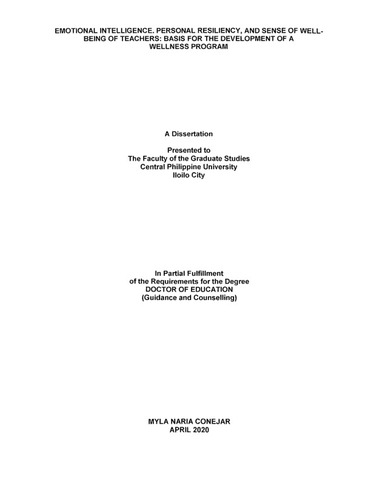Ipakita ang simpleng tala ng item
Emotional intelligence, personal resiliency, and sense of wellbeing of teachers: Basis for the development of a wellness program
| dc.contributor.adviser | Java, Margen A. | |
| dc.contributor.author | Conejar, Myla Naria | |
| dc.date.accessioned | 2021-09-02T07:42:38Z | |
| dc.date.available | 2021-09-02T07:42:38Z | |
| dc.date.issued | 2020 | |
| dc.identifier.citation | Conejar, M. N. (2020). Emotional intelligence, personal resiliency, and sense of well being of teachers: basis for the development of a wellness program (Unpublished Doctoral dissertation). Central Philippine University, Jaro, Iloilo City. | en_US |
| dc.identifier.uri | https://hdl.handle.net/20.500.12852/1357 | |
| dc.description | Abstract only Chapter 1 and questionnaire available upon request | en_US |
| dc.description.abstract | This study was conducted to determine the relationships of the respondents’ emotional intelligence, personal resiliency, and sense of well-being in a state university for the School Year 2018-2019. The sample consisted of 214 randomly selected faculty members of the state university. The standardized instruments were administered to measure the emotional intelligence, personal resiliency and sense of well-being of the respondents namely: Nicholas Hall’s Emotional Intelligence, Andrew Durbin’s Personal Resiliency, and McKinley’s Sense of Well-being. Results revealed that majority of the respondents were female, middle age, married, ten years and below teaching experience, Instructor/Assistant Professor, and with an average monthly income. The emotional intelligence of the respondents was high so as to its classifications. Likewise, the respondents had a great extent personal resiliency and a high sense of well-being. The personal resiliency can influence the relationship between the respondents’ emotional Intelligence and sense of well-being. Moreover, the personal resiliency and emotional intelligence were highly and positively related. The correlation between emotional intelligence and sense of well-being had positive and significant relationship. No significant relationship existed between personal resiliency and sense of well-being. | en_US |
| dc.format.extent | viii, 134 leaves | en_US |
| dc.language.iso | en | en_US |
| dc.subject.ddc | GSL Theses 378.242 C756 | en_US |
| dc.subject.lcsh | Emotional intelligence | en_US |
| dc.subject.lcsh | Resilience (Personality trait) | en_US |
| dc.subject.lcsh | Well-being | en_US |
| dc.subject.lcsh | Health | en_US |
| dc.subject.lcsh | Teachers | en_US |
| dc.subject.lcsh | College teachers | en_US |
| dc.title | Emotional intelligence, personal resiliency, and sense of wellbeing of teachers: Basis for the development of a wellness program | en_US |
| dc.title.alternative | Emotional intelligence, personal resiliency, and sense of well being of teachers: Basis for the development of a wellness program | en_US |
| dc.type | Dissertation | en_US |
| dc.description.bibliographicalreferences | Includes bibliographical references | en_US |
| dc.contributor.chair | Junsay, Merle | |
| dc.contributor.committeemember | David, Fely P. | |
| dc.contributor.committeemember | Loyola, Ma. Lulu L. | |
| dc.contributor.committeemember | Valaquio, Belinda R. | |
| dc.contributor.department | School of Graduate Studies | en_US |
| dc.description.degree | Doctor of Education major in Guidance and Counselling | en_US |


